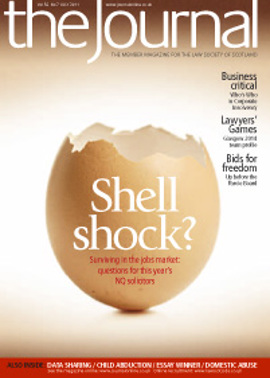Going the distance

In-house work presents its challenges, but few are likely to surpass those confronting the legal team at Glasgow 2014 Ltd, the company behind the next Commonwealth Games. An event that will involve a third of the countries on the planet, 6,500 visiting athletes and officials, up to 15,000 volunteer helpers, 17 sports crammed into 11 days of competition, and a TV audience estimated at 1.5 billion, throws up a host of legal issues far beyond the main infrastructure for the Games themselves.
Holding the legal threads together is a team of (currently) four solicitors, serving an organisation of about 57 staff, a figure now growing steadily as the countdown to the Games gathers pace.
Head of Legal is Shonagh MacVicar, who has corporate and commercial contract experience in private practice but a more recent background in-house with the Student Loans Company and a US based software company, McLaren Software. One of the first employees on board in 2008, MacVicar has taken responsibility for the legal milestone planning, legal compliance across Glasgow 2014 and all legal risk for the games.
Her three colleagues have all been attracted in from private practice: Douglas Roberts, formerly with Semple Fraser, has a remit including broadcasting and sponsorship; Euan Faulds, who joined from Shepherd and Wedderburn, deals with corporate, marketing, communications, HR and other issues; and Stephanie Daniel, who moved over last year from DLA Piper where she previously supported the Games bid team, covers the key areas of Games time delivery, such as contracts for venues, sports, accommodation, logistics, transport, technology and security.
All tied up
It is easy to envisage crucial contract documentation over stadium hire and/or construction work (Hampden Park, for example, is the athletics venue but has to have a temporary track installed 1.9m higher than the football pitch), the athletes’ village, major sponsorship deals, broadcasting rights and so on. What comes as more of a surprise is the amount of legal work behind the opening and closing ceremonies.
Faulds was in Delhi for the handover ceremony at the end of the 2010 Games: “an eight minute piece, but essentially a full time job: over 200 contracts were delivered just for that segment, and obviously the opening and closing ceremonies are each fairly lengthy”. Cast members, music, agent negotiations for any special appearances – the list goes on.
I suggest it might sound like overkill all the same. “There are things we’ll do differently,” Faulds responds. “We may move to a different model by awarding a smaller number of high value contracts and then these will cascade down, though nothing’s been agreed yet.” Sounds like legal work for someone in any event.
Then there is the Queen’s Baton Relay, the equivalent of the Olympic torch, which will visit many of the 71 member countries on its way. There are security teams, jurisdictional issues, safety aspects and more to cover, quite apart from who gets to carry the baton.
So despite all the work put in place already, the team expects to grow to a peak of 11 between now and the Games – though by the time of the event itself, two will already have left again and others may find themselves redeployed as need requires. (Starting guns, anyone?)
The breadth of the work – some of it is outsourced, but the team take on as much as they can themselves – can be seen in its division into about 61 “functional areas”, including the normal aspects of running any corporate business: Glasgow 2014 is a private company limited by guarantee. Another feature is the frequent liaison and co-work with external agencies: not just those who have a stake in the company (Scottish Government, Glasgow City Council and Commonwealth Games Scotland), but the police, individual sport governing bodies, the anti-doping agency WADA…
Beaten track
In just a year’s time, of course, there is the small matter of the London 2012 Olympics and Paralympic Games. With the organising committee LOCOG being two years ahead, the Glasgow team have found them very willing to share knowhow. “They’re going through exactly the same issues as we are, although it’s a bigger event”, says Faulds. “It’s just fantastic we’ll have the benefit of that.”
Alas, the team will be too busy to take the time out to watch the Olympics unfold from the inside – though with Hampden being used as an Olympic venue, they will be able to learn from the programme to combat ambush marketing (tactics by companies not associated with the Games but seeking a visible presence to suggest that they are). Daniel was however in Delhi for the previous Commonwealth Games and MacVicar went to the 2010 Vancouver Winter Paralympics under the observer programmes – a series of seminars and workshops designed to transfer knowledge to the next host cities and bidding cities. Unlike the Winter Games, parasports in the Commonwealth Games are integrated as part of the Games.
There are differences with London. Whereas the 2012 organising committee is privately funded, Glasgow 2014 Ltd is significantly publicly funded, therefore has to adhere more strictly to the procurement regulations. Also, the International Olympic Committee handles broadcasting, top level sponsors, and trademarking of its brand, whereas the Commonwealth Games Federation (CGF) acts as overseers but grants rights to the organising committee to market and promote the Commonwealth Games.
Naturally Glasgow, with a million of its own to sell, is taking a close interest in the experiences of the London ticket booking system. “Ticketing is key and that’s an interesting contract for us to negotiate”, Roberts agrees. “We’ve certainly been down to speak to the guys in London and will go over their experiences and hopefully learn from that. Six of the eight 100m finalists in Beijing 2008 were from Commonwealth countries, so we’re expecting a huge demand.”
Investor protection
Probably as important as ensuring the Games venues are ready is the intellectual property work, which underpins the efforts to raise the hoped-for £100 million in commercial revenue through sponsorship, broadcasting, ticket sales and merchandise. As well as lengthy work to trademark the Games logo at home and abroad (another contractual requirement of the CGF), there are medals, mascots, pictograms, “a whole host of assets that we have to protect because sponsors are buying those rights, the opportunity to showcase their association with Glasgow 2014, so it’s extremely important that they’re protected to the appropriate extent”, says Daniel.
Broadcasting rights have also to be settled, through the appointment of a host broadcaster and the sale of rights to other broadcasters at domestic and international level.
Ambush marketing is the big enemy. The legislation setting out specific prohibitions is already in place. Brand protection is a constant and needs the full co-operation of external partners. TV camera angles will have to be checked for what falls within shot. And come the event, a team of volunteers (law students are welcome to apply) will mingle with the crowds to look out for offending brand identities, with individuals potentially being asked to remove offending items of clothing.
Sponsorship income is crucial to the success of the Games, and the recession has not helped efforts to win business support. I wondered if London 2012 was liable to suck up much of the remaining available cash. Not necessarily, says Roberts: “If you think about it, in London, Team GB are competing together, but two years later will split up and compete against each other as different nations. That’s really exciting and I think a lot of sponsors will see the benefits of London, and in particular for every sponsor in London there’s a few who tried to get it and didn’t, so we certainly see it as an opportunity.”
He adds: “This is the biggest event that’s ever hit Scotland, the biggest that will be going on in the world. We’re not big enough to host the World Cup or the European Championship or the Olympics, and also with England losing out on the 2018 football World Cup, one of the biggest that Britain will have for some time.”
Endurance event
Does it seem a long time yet till 2014? (For the record, it’s 23 July to 3 August that year.) Absolutely not, the team agree. “I remember this time last year it was four years to go”, says Daniel, “and now it’s three years and I can’t believe I’ve been here over a year.”
“It’s tremendously fast paced”, MacVicar adds. “To be fair we all put in pretty long hours. We’re all dedicated to the cause, it’s fantastically exciting and the days are just going so fast.”
And when it’s all over? Not just a big party as they all collect their P45s. A couple of the team will stay on and do the post-Games reporting to the CGF to assist future games, further IP work, internal support as the company winds down, and finally the dissolution responsibilities as well.
Meantime, as Faulds puts it, “It’s a cliché to say that it’s a way of life but I think you do have to be pretty interested in what you’re doing day to day.”
Then again, all the team realise it’s a once in a lifetime career chance. “Personally I would want to showcase that”, says MacVicar, “because this is an amazing opportunity, and it’s not until you get into the details of what we’re doing that you realise the magnitude of what it is we have to achieve, the sense of responsibility that this Games comes off for Glasgow and Scotland, and that we follow what we’re trying to do, to stage an outstanding event on time and on budget. This is a fantastic team and I’m really looking forward to the Games.”
Games facts and figures
- Dates: 23 July- 3 August 2014
- Countries eligible: 71
- Athletes taking part: 6,500
- Sports represented: 17
- Volunteer helpers: about 15,000
- Tickets to be sold: about 1,000,000
- Estimated global TV audience: 1.5 billion
- Budget (2010-11 figures): £523.6m
In this issue
- Employee ownership: untapped succession solution for legal firms
- Cash call: cornering the council tax
- Tobacco Act sound
- Public profile
- Too much heat, not enough light
- Newly hatched
- Money matters
- Families in fear
- Get out of jail?
- People's choice
- E for explanation
- Who's Who in Corporate Insolvency
- Care with sensitive case papers
- Bullying: time to crack down
- SYLA reports successful year
- Middle East: back to growth
- Sheriff court auditor role to be restricted
- Law reform update
- From the Brussels office
- Solicitor's guide to internet porn
- Ask Ash
- Data sharing – the good practice guide
- Legal Risks – a conference reviewed
- Long-term solutions
- Removing hardship?
- 18 or 21?
- Lenders in the shade
- Demolition derby
- Time to come clean
- Scottish Solicitors' Discipline Tribunal
- Website review
- Book reviews
- Going the distance
- Fashion retailing comes to court






